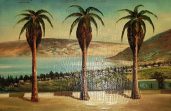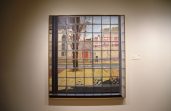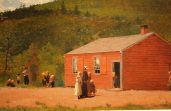Happy Birthday Israel!
By the rivers of Babylon we sat and wept when we remembered Zion. There on the poplars we hung our harps, for there our captors asked us for songs, our tormentor demanded songs of joy; they said, “Sing us one of the songs of Zion!” How can we sing the songs of the LORD while in a foreign land? If I forget you, O Jerusalem, may my right hand forget its skill. May my tongue cling to the roof of my mouth if I do not remember you, if I do not consider Jerusalem my highest joy. Remember, O LORD, what the Edomites did on the day Jerusalem fell. “Tear it down,” they cried, “tear it down to its foundations!” O Daughter of Babylon, doomed to destruction, happy is he who repays you for what you have done to us- he who seizes your infants and dashes them against the rocks. ~Psalms 137~ A court philosopher was once trying to impress upon his French king the truth of religion. Whereupon the king turned to him and said, “I challenge you to cite a single miracle.” The Philosopher answered simply, “Sire, the Jews.” ~ A Miracle –A Modern Treasury of Jewish Thoughts ~ He got up, put on his black vest and jacket, adjusted his gold-rimmed spectacles and his black hat, and stepped into the courtyard. There before Weingarten stood a middle-aged British major wearing the yellow-and-red insignia of the Suffolk Regiment. From his right hand dangled a bar of rusted iron almost a foot long. With a solemn gesture he offered it to the elderly rabbi. It was a key, the key to Zion Gate, one of the seven gates of the Old City of Jerusalem. “From the year 70 A.D. until today,” he said, “a key to the gates of Jerusalem has never been in Jewish hands. This is the first time in eighteen centuries that your people have been so privileged.” Weingarten extended a trembling hand to accept the key. Jewish legend held that on the night the Roman Emperor Titus destroyed the Temple, its despairing priests had thrown the keys of Jerusalem to heaven crying “God, henceforth be Thou the guardian of the keys.” Now the improbable agent of their return to Jewish hands stood to attention and saluted. ~Larry Collins & Dominique Lapierre ~ They had no state, holding them together, no country, no soil, no king, nor form of life in common. If, in spite of this, they were one, more one than all the other people of the world, it was the Book that sweated them into unity. ~Leon Feuchtwanger – Power ~ “Eleh yamduh. These shall stand.” ~ David Ben-Gurion – In response to the reaction of the newly created Israel as the first Egyptian bombs landed on May 8, 1948 ~ “In any case, only eleven minutes after Israel became a state in May, its existence was officially recognized by the United States. A year later the chief Rabbi of Israel came to see the President, and told him, ‘God put you in your mother’s womb so that you could be the instrument to bring about the rebirth of Israel after two thousand years.’ At that, great tears started rolling down Harry Truman’s checks.” ~ Merle Miller – Plain Speaking ~There is no stronger story or history than all that is Israel. In truth it is sheer vanity to attempt to add anything to what has already been written, so today I keep my words brief, and let others speak, on these pages.
Before I learned the history of the United States, where I was born, I was taught the history of Israel. The stories of Abraham, Isaac, and Jacob, were told to me, as a child, with colorful cut out figures that adhered to a flannel board. I knew Samuel, Gideon, Esther, Deborah and Ruth; and I loved David and Solomon, marveled at Elijah and Elisha, and wondered if I would have the strength of Daniel, should the need arise. I still read the stories of Israel and still find comfort, joy, and hope, every time I open my Bible.
But I add to my list of heroes Golda Meir, David Ben-Gurion, and Moshe Dayan; as well as the countless men and women who lived and died to see the rebirth of Israel. There is no other nation, which has been birthed, tested, and reborn by fire, as Israel has and continues to be, yet she still stands, lifting her cup to L’Chaim – to life!
That is all for now.
May 2008
Aunt Lazarus
“I liked the New Testament stories best, especially the Gospels. And when I was older, I was very much interested in the way those fellas saw the same things in a different manner. A very different manner, and they were all telling the truth. I think that’s the first time I realized that no two people ever see the same thing in quite the same way, and when they tell it the way they saw it, they aren’t necessarily lying if it’s different.”
~ Harry S Truman ~On May 22, at 8:24, in the evening, my Aunt passed away. Kate had taken to calling her Aunt Lazarus, after the New Testament Lazarus of John 11, brother to Mary and Margaret.
In the story, Lazarus is ill, and his sisters send word to Christ, that the one He loves is sick. The sisters are expecting Christ to come immediately, to pray for Lazarus that his health might be restored. Christ lingers, and does not arrive in Bethany until after Lazarus has died, though Christ boldly and decisively proclaims: “This sickness will not end in death. No, it is for God’s glory so that God’s Son may be glorified through it.” (John 11:4)
Both Mary and Martha tell Christ that had He been there, their brother would still be alive. He answers them saying: “I am the resurrection and the life. He who believes in me will live, even though he dies; and whoever lives and believes in me will never die. Do you believe this?” (John 11: 25-26)
The women believe Christ to be speaking of the eternal life promised to the believers. They are not entirely incorrect, but Jesus deeply moved, also has other plans for Lazarus. “Jesus called in a loud voice, ‘Lazarus, come out!’ The dead man came out, his hands and feet wrapped with strips of linen, and a cloth around his face. Jesus said to them, ‘Take off the grave clothes and let him go.’” (John 11: 43-44)
As I have previously stated, on these pages, whether or not you believe the divinity of the story, the drama and passion are breathtaking. This miracle will by chapters end, lead to the beginning of the plot to take Christ life, and thus usher in the fulfillment of the hope of eternal life! Yes, an exclamation mark is required.
I am partial to this story for many reasons. It is a chapter full of strength and power. Christ never seems confused about His choices or directives. He is bold in his proclamations and follows through with His word. I love how much of Christ personality is revealed in this chapter. You see Him as this gentle teacher, who must have wanted to thump his disciples, more than once – Christ tells them Lazarus is asleep and they respond, that this means he is getting better. You also see the love He felt for this family of siblings, and His concern for their very human, broken heart, despite the fact that they all believed in an afterlife. You see the inner working of His relationship with God, and perhaps even their mutual frustration with us lowly folks who do not always see the obvious. “Father, I thank you that you have heard me. I knew that you always hear me, but I said this for the benefit of the people standing here, that they may believe that you sent me.” (John 11: 41-42)
Finally, I also love this story because it so reminds me of my Father. This is a great sermon chapter, one my Father often preached. I can not honestly say I remember his take on the story, but I can still hear him, in a very loud voice, gesturing with hands, as he called out Lazarus to come forth, in Spanish, of course.
I met my Aunt the year my Father died. Perhaps there had been an earlier meeting, during my youth, but neither she nor I recalled our paths having previously crossed.
My Father had died, and my Mother had gone back to Columbus, Ohio, the area where she and her family are from, and I had gone to visit my Mother and sister. My Aunt’s husband, Paul, was still alive, and they divided their time between their home in Ohio, and their home in Florida.
I went to her house in Ohio, with my Mother, for some now forgotten reason. It was a fine house, but what left a lasting impression, on me, was the asparagus growing in her yard. That was before my Master Gardening days, but I knew enough about asparagus to realize that it was not a crop for the weak or flighty. It can take three to five years, of tender and demanding care, for asparagus plants to offer up their delectable bounty. Her asparagus patch was impressive – also, she gave me a Regan button, what was there not to love?
At the time, I could not imagine that I would one day come to share so much with this woman, who seemed so foreign to me and with whom I felt so little connection, not having grown up in Columbus or around my Mother’s family.
I saw her and Paul occasionally during the time I spent in Columbus, in the fall of 1986 and the first few weeks of 1987, when I left to return to California. In 1992, as Florida defied Hurricane Andrew, My Mother, Kate, and I planned a holiday in Florida. Kate and I were bringing my Mother to see her sister, while we were to be tourist. I did not imagine, during that visit, that I would someday own a house in Tamarac, just like my Aunt – but I have jumped ahead, in my story.
My Aunt returned the visit, and came to California for a two week visit, where I was able to share our mutual love for the Republican party, taking her to the Nixon Library, where she bought me a copy of Patricia Nixon’s biography, and out to Simi Valley, to the Regan Library, that we both agreed was not as nice as the Nixon Library.
She met the rest of my family during that trip, my sisters, their husbands, and their daughters.
We also shared our mutual pleasure in the garden, she was particularly found of my roses, and exchanged recipes, even baking bread together. Though she hated my mashed potatoes, which I like lumpy, with skins, sour cream, and texture – heathen that I am. She thought they should be peeled, whipped with a hand mixer, a dab of butter, and milk. My Aunt loved to shop – clothes and antiques! I ran her around Los Angeles, as if she were a fifteen year old, as opposed to an older woman with an inoperable heart condition.
When we moved to Maine, she and her neighbor and best friend, Ann, came to Maine for two weeks, continuing the Republican pilgrimage to Kennebunkport, where the Bush compound stands. We visited Boston, and Concord, with her ever faithful nitroglycerin pills, she kept up.
My first visit to Florida, from Maine, came in the middle of the night, when my Aunt called to tell me that she had an ovarian tumor and would need surgery. Because of her weakened heart, surgery was a risky and frightful proposition. I told Kate that we had to go see my Aunt. Kate, God bless, did not put up an argument, but simply said yes and off we headed, in what I think was our last road trip, in our little truck. We arrived in Florida in the middle of the night – too early or too late, to call upon my Aunt. (That was the night we found Primanti Pizza, which was the only thing open all night – but that is another story.)
In the morning, we went to see my Aunt, who seemed happy to see us, but quickly informed us that we could not stay with her, as her children were coming to town. It was a strange moment, and one of many to follow in our relationship. I do not recall having asked to stay with her; I had simply been worried about this woman that I had come to love. But whatever our relationship was, I was not one of her children. When my Aunt died, one of the first things my cousin said, as we all stood, in the hospital room, was that my Aunt lived for her children – I thought, yes, that was true.
Over the years, I would come to think of my Aunt as one of those girlfriends, from high school, who adored you until they got a boyfriend. I do not write those words as a criticism, just as a fact of her character. There really was no one that she loved more than her children.
I spent countless hours in hospital emergency rooms with my Aunt, the last a few months ago, when she broke her hip, and her final convalescence began. I had gotten to know her body well, and could always tell when she was having trouble breathing, as her lungs were filling with water and her heart struggling to beat. I dreaded the calls to her daughter, who lived out of state, where I would be asked how my Aunt was doing? My Father died alone. My sisters and I were told to go home, for the night that he needed his rest. At 7 o’clock, in the morning, he had his fourth and fatal heart attack. I did not want my Aunt to die without her children – should my cousin catch the next flight, or could she wait a few days?
My Aunt’s real name was Helen Virginia Cooper Patton. Kate called her Aunt Lazarus because Helen always seemed to defy death. During her last day of life, I sat by her bedside, holding her hand, like I had done so many times before, and even though her daughter had assured me that the doctors said that this was the end, I actually prayed for her, thinking – who knows, Aunt Lazarus has done it before, she may still make it, but she did not.
Now, “I come to bury Caesar not to praise him.” During my sophomore year, of high school, I had to memorize that speech, “Friends, Romans, and Countrymen,” from Julius Caesar, by William Shakespeare, and recite it in front of the class. I do not now recall if I understood it then, but I do now and I have been thinking about those words, since my Aunt passed away. It is a great speech from a play about how complicated people are – contrary to my enjoyment of the black and white this is a play about how grey we are – for better or for worse. In the speech, Mark Anthony does indeed come to praise Caesar, who in fact lived an honorable life.
I have spent the last few weeks thinking about what I wanted to say about Aunt Helen, on these pages. Death has an odd way of turning all of the tables.
She was my first Cooper – the first member of my Mother’s family which I got to know as a whole person. She told me about her marriage, her work, her family – her fears, her dreams, and her hopes. Through the twenty two years which I knew her, there were moments of hurt and frustration, and I know that was mutual, because we actually managed to have a relationship, though the odds were certainly against us ever knowing one another, given that we did not meet until later in life. My Aunt gave me insight into her world, and therefore my own world, for which I am grateful. I will miss her.
“My heart is in the coffin there with Caesar, and I must pause till it come back to me” (Julius Caesar)
That is all for now .











